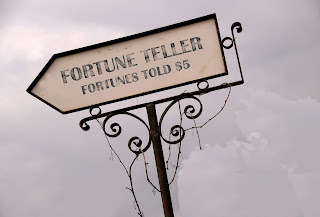There once was a grant writer with a big problem. No matter how much he wrote and wrote, none of his grants were getting funded. He was in despair and began to lose hope. In between grant applications, he began to submit employment applications for jobs in other fields.
One day, while delivering a resume for a job as a truck driver, the unhappy grant writer walked past a store with a sign in from on a pole that was leaning precariously as though it may fall over with the slightest breeze. The sign read, “Fortune Teller – Fortunes Told $5.”
He pulled his thin wallet from his pocket and opened it to find only four dollars inside. Thegrant writer sighed deeply and put his wallet away. He turned to walk away when the door of the shop opened and an ancient woman peered out at him and motioned at him to come in.
Quickly the grant writer looked behind him but seeing he was alone he knew she meant for him to come inside. He had second thoughts about the whole idea because he was broke and could ill-afford spending even four dollars on such a dubious adventure as having his fortune read. The old woman again motioned for him to enter.
He was in desperate straits and willing to take any course to change his grant writing luck so he ambled up the walk and into the dim, cluttered shop where the old woman had positioned herself behind a small table draped with black cloth. In the center of the table was a large, shimmering crystal ball. The woman wore a black gown with a multi-colored sash around her shoulders. Her long, silky, white hair cascaded lightly about her shoulders. Her face was wrinkled and craggy, and her nose long and crooked. She had an air of ancient mystery about her.
The old woman gazed intently at him, “Sit down,” she invited. The grant writer meekly took the chair opposite her. “I knew you would come today,” she said in a low, even voice that had a metallic quality. “What is it you want to know?” she asked the grant writer. He was nervously peering into the crystal ball trying hard not to meet her glassy, black eyes. “I want to know if any of my grants will get funded,” he asked very seriously, “You see, I am a grant writer…” “I know what you do,” she interrupted.
“How do you know?,” he asked her. “I see all and I know all,” She told the grant writer. He merely gaped at her in wonder. “So…so, you can tell me if my grants will be funded or not?” “I can,” she asserted with confidence, “Sadly, none of your grants will be funded.”
The grant writer’s face fell and his eyes searched the crystal ball for answers. “Why, why won’t they get funded?” he pleaded with the old woman to tell him. “Because, you mislabeled the address on the envelopes and they’ve all been coming here to me,” she stated flatly as she plopped a stack of fat envelopes in front of the grant writer. “This is 501 Capitol Avenue and you should have written 501 Capital Avenue on these envelopes. The post office knows how to spell young man, if you’re going to be a successful grant writer, so must you,” advised the sage old woman.
So the grant writer took the old woman’s advice. He learned to use spell check, he read each narrative carefully, and he hired an hourly editor to review each grant. Soon, the grant writer was successful and nearly all of his grant applications were funded!
The moral to the story – The postman cannot read your mind.


Now, that's a fortune-teller I can listen to, although I think it was the editor, not the spell-checker, that helped him with capitol vs. capital.